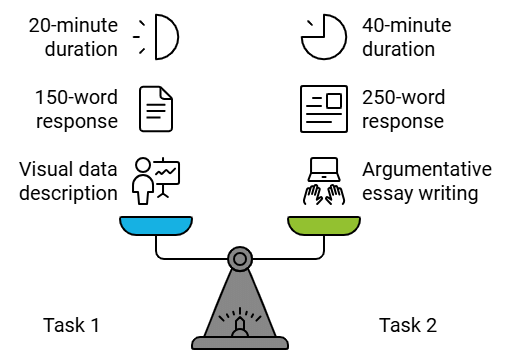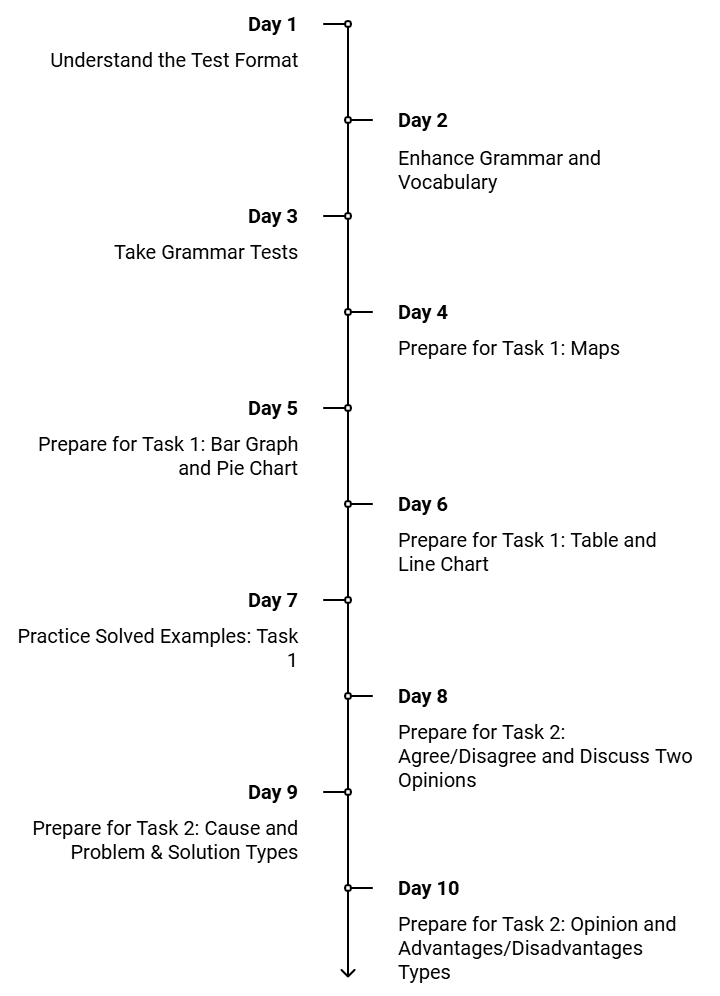IELTS Exam > IELTS Notes > Writing for Academic IELTS > 14-Day Study Plan for IELTS Academic Writing Test
14-Day Study Plan for IELTS Academic Writing Test | Writing for Academic IELTS PDF Download
The IELTS Academic Writing Test is designed to assess a wide range of writing skills, including how well you:
- write a response appropriately
- organise ideas
- use a range of vocabulary and grammar accurately.
Here are some more details about the Academic Writing test:
Duration: 60 minutes
No. of questions: There are no multiple questions in the Writing section.
Test format: The Academic version of the Writing component consists of two tasks, each addressing topics of broad relevance and suitability for individuals entering undergraduate or postgraduate studies, or those seeking professional registration.

- IELTS Academic Task 1: You are given a graph, table, chart, or diagram and are asked to describe the visual information in your own words. You are asked to write at least 150 words in about 20 minutes.
- IELTS Academic Training Task 2: In Task 2 you are presented with a point of view or argument or problem. You need to write your response in 250 words in about 40 minutes.
Preparing for the IELTS Academic Writing test in 14 days requires mastering both Task 1 and Task 2, building strong writing skills, and understanding assessment criteria. Here's a step-by-step 14-day plan:

Day 1: Understand the Test Format
- Familiarize Yourself with Writing Test Structure: Understand How to Prepare for IELTS Academic Writing Test.
- Learn Tips & Tricks: Watch videos to learn how to use formal language, avoid contractions and keep your essay clear and well-structured.
Day 2: Enhance Grammar and Vocabulary
- Grammar: Practice sentence structures: simple, compound, and complex. Work on subject-verb agreement, tenses, and conditional sentences.
- Vocabulary: Build topic-specific word banks (e.g., environment, education, health). Learn synonyms to avoid repetition (e.g., "important" → "significant").
Day 3: Take Grammar Tests
- Assess Your Grammar Skills: Take diagnostic tests to identify weak areas. Focus on areas like punctuation, relative clauses, and articles.
- Practice: Solve timed grammar exercises. Incorporate grammar rules into short writing tasks (e.g., writing topic sentences).
Day 4: Prepare for Task 1: Maps
- Understand Map Descriptions: Learn how to describe changes over time (e.g., "was developed," "remained unchanged").Use prep ositions of place and direction (e.g., "to the north," "adjacent to").
- Practice: Analyze practice maps and write 150-word summaries. Focus on clear comparisons and key features.
Day 5: Prepare for Task 1: Bar Graph and Pie Chart
- Understand Data Description: Bar Graphs: Compare trends, use percentages or figures, and describe variations. Pie Charts: Explain proportions and relationships between segments.
- Practice: Write descriptions emphasizing comparisons and contrasts. Use linking phrases like "in contrast," "similarly," and "the highest percentage."
Day 6: Prepare for Task 1: Table and Line Chart
- Understand Data Description: Tables: Summarize key information concisely. Line Charts: Focus on trends over time, using words like "fluctuate," "peak," and "decline."
- Practice: Write practice summaries using accurate terminology and varied sentence structures.
Day 7: Practice Solved Examples: Task 1
- Review Sample Answers: Analyze model answers to understand structure and vocabulary usage.
- Practice: Write Task 1 responses for a variety of visual data types. Focus on timing, aiming to complete the task in under 20 minutes.
Day 8: Prepare for Task 2: Agree/Disagree and Discuss Two Opinions
- Learn Structures: Agree/Disagree: Clearly state your stance in the introduction and support it with examples. Discuss Two Opinions: Present both views impartially and conclude with your opinion.
- Practice: Write essays on topics like "Should education be free for everyone?" Use linking phrases: "On the one hand," "Moreover," "Therefore."
Day 9: Prepare for Task 2: Cause and Problem & Solution Types
- Learn Structures: Cause and Problem: Explain reasons behind an issue and its effects. Solutions: Propose practical and logical solutions.
- Practice: Write essays on topics like "What are the causes and solutions for air pollution?" Use structured paragraphs with clear topic sentences.
Day 10: Prepare for Task 2: Opinion and Advantages/Disadvantages Types
- Learn Structures: Opinion: Clearly express and justify your view with examples. Advantages/Disadvantages: Weigh both sides and conclude with a balanced opinion or preference.
- Practice: Write essays on topics like "Do the benefits of social media outweigh its drawbacks?" Use varied vocabulary and sentence patterns.
Day 11: Practice Solved Examples: Task 2
- Analyze Sample Essays: Focus on structure, vocabulary, and grammatical accuracy in high-scoring responses.
- Practice: Write full-length Task 2 essays under timed conditions. Revise drafts to improve coherence and vocabulary.
Day 12-13: Take Practice Tests
- Simulate Exam Conditions: Complete both Task 1 and Task 2 within 60 minutes. Focus on time management and accuracy.
- Analyze Performance: Review mistakes and identify areas for improvement. Compare your essays to band 8+ samples to refine techniques.
Day 14: Final Preparation and Relaxation
- Revise Key Points: Revisit common structures, linking phrases, and vocabulary lists. Review successful strategies for each task type.
- Relax: Avoid cramming on the final day. Get adequate sleep and stay calm to approach the test with confidence.
The document 14-Day Study Plan for IELTS Academic Writing Test | Writing for Academic IELTS is a part of the IELTS Course Writing for Academic IELTS.
All you need of IELTS at this link: IELTS
|
30 videos|206 docs|17 tests
|
FAQs on 14-Day Study Plan for IELTS Academic Writing Test - Writing for Academic IELTS
| 1. What is the structure of the IELTS Academic Writing Test? |  |
Ans. The IELTS Academic Writing Test consists of two tasks. Task 1 requires you to describe visual information, such as graphs, charts, or diagrams, in at least 150 words. Task 2 is an essay where you must respond to a question or a point of view in at least 250 words.
| 2. How can I improve my IELTS Academic Writing score? |  |
Ans. To improve your IELTS Academic Writing score, practice writing regularly, familiarize yourself with the test format, and review high-scoring sample answers. Focus on developing clear arguments, using a variety of vocabulary and grammar structures, and ensuring your work is coherent and cohesive.
| 3. What common mistakes should I avoid in the IELTS Academic Writing Test? |  |
Ans. Common mistakes to avoid include not answering the question fully, using informal language, making grammatical errors, and failing to organize your writing logically. Additionally, be careful with spelling and punctuation, as these can affect your score.
| 4. How is the IELTS Academic Writing Test assessed? |  |
Ans. The IELTS Academic Writing Test is assessed based on four criteria: Task Achievement, Coherence and Cohesion, Lexical Resource, and Grammatical Range and Accuracy. Each criterion contributes to your overall score, so it's important to perform well in all areas.
| 5. Can I use personal examples in my IELTS Academic Writing Task 2 essay? |  |
Ans. Yes, you can use personal examples in your IELTS Academic Writing Task 2 essay. However, make sure they are relevant to the topic and help support your argument. Personal examples can make your essay more engaging and relatable, but they should not dominate your response.
Related Searches
















